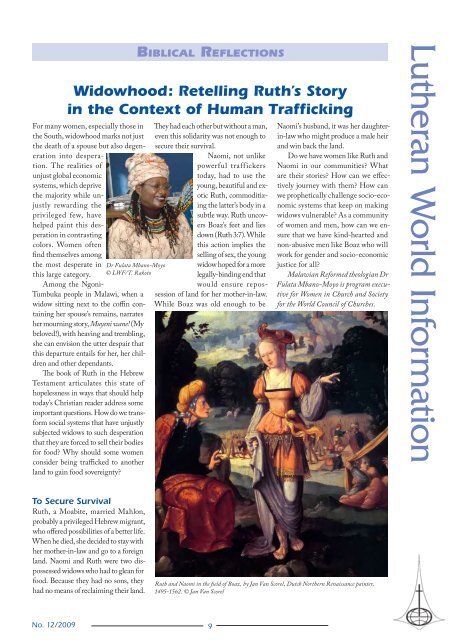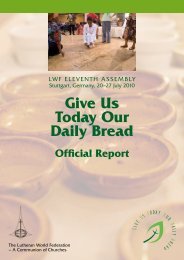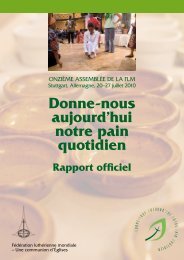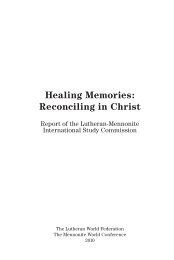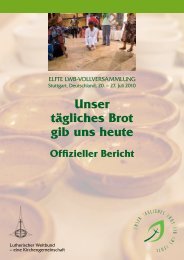Women's Daily Bread - LWF Assembly
Women's Daily Bread - LWF Assembly
Women's Daily Bread - LWF Assembly
You also want an ePaper? Increase the reach of your titles
YUMPU automatically turns print PDFs into web optimized ePapers that Google loves.
Biblical Reflections<br />
Widowhood: Retelling Ruth’s Story<br />
in the Context of Human Trafficking<br />
For many women, especially those in<br />
the South, widowhood marks not just<br />
the death of a spouse but also degeneration<br />
into desperation.<br />
The realities of<br />
unjust global economic<br />
systems, which deprive<br />
the majority while unjustly<br />
rewarding the<br />
privileged few, have<br />
helped paint this desperation<br />
in contrasting<br />
colors. Women often<br />
find themselves among<br />
the most desperate in<br />
this large category.<br />
Among the Ngoni-<br />
Tumbuka people in Malawi, when a<br />
widow sitting next to the coffin containing<br />
her spouse’s remains, narrates<br />
her mourning story, Muyeni wane! (My<br />
beloved!), with heaving and trembling,<br />
she can envision the utter despair that<br />
this departure entails for her, her children<br />
and other dependants.<br />
The book of Ruth in the Hebrew<br />
Testament articulates this state of<br />
hopelessness in ways that should help<br />
today’s Christian reader address some<br />
important questions. How do we transform<br />
social systems that have unjustly<br />
subjected widows to such desperation<br />
that they are forced to sell their bodies<br />
for food Why should some women<br />
consider being trafficked to another<br />
land to gain food sovereignty<br />
Dr Fulata Mbano-Moyo<br />
© <strong>LWF</strong>/T. Rakoto<br />
They had each other but without a man,<br />
even this solidarity was not enough to<br />
secure their survival.<br />
Naomi, not unlike<br />
powerful traffickers<br />
today, had to use the<br />
young, beautiful and exotic<br />
Ruth, commoditizing<br />
the latter’s body in a<br />
subtle way. Ruth uncovers<br />
Boaz’s feet and lies<br />
down (Ruth 3:7). While<br />
this action implies the<br />
selling of sex, the young<br />
widow hoped for a more<br />
legally-binding end that<br />
would ensure repossession<br />
of land for her mother-in-law.<br />
While Boaz was old enough to be<br />
Naomi’s husband, it was her daughterin-law<br />
who might produce a male heir<br />
and win back the land.<br />
Do we have women like Ruth and<br />
Naomi in our communities What<br />
are their stories How can we effectively<br />
journey with them How can<br />
we prophetically challenge socio-economic<br />
systems that keep on making<br />
widows vulnerable As a community<br />
of women and men, how can we ensure<br />
that we have kind-hearted and<br />
non-abusive men like Boaz who will<br />
work for gender and socio-economic<br />
justice for all<br />
Malawian Reformed theologian Dr<br />
Fulata Mbano-Moyo is program executive<br />
for Women in Church and Society<br />
for the World Council of Churches.<br />
Lutheran World Information<br />
To Secure Survival<br />
Ruth, a Moabite, married Mahlon,<br />
probably a privileged Hebrew migrant,<br />
who offered possibilities of a better life.<br />
When he died, she decided to stay with<br />
her mother-in-law and go to a foreign<br />
land. Naomi and Ruth were two dispossessed<br />
widows who had to glean for<br />
food. Because they had no sons, they<br />
had no means of reclaiming their land.<br />
Ruth and Naomi in the field of Boaz, by Jan Van Scorel, Dutch Northern Renaissance painter,<br />
1495-1562. © Jan Van Scorel<br />
No. 12/2009


